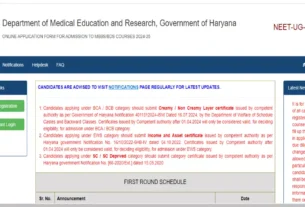The escalating trend of student suicides in Kota, a city recognized for its extensive coaching facilities aimed at preparing aspirants for competitive exams like the National Eligibility cum Entrance Test (NEET), has raised serious concerns regarding the mental health of students. The recent tragedy involving an 18-year-old NEET aspirant, who was discovered hanging in their paying guest accommodation, has heightened the urgency with which this matter must be addressed. This incident marks the seventh reported student suicide in Kota this year alone, which can no longer be regarded as an isolated occurrence but rather part of a worrying pattern.
Kota has positioned itself as a powerhouse for aspiring medical and engineering professionals, attracting thousands of students annually. However, the pressure associated with achieving high scores in these competitive examinations can lead to overwhelming stress and anxiety. Reports suggest that the high incidence of suicides might be linked to the relentless academic competition and the immense expectations placed upon these young individuals by both society and their families. A statistical review indicates that the suicide rate in Kota has seen a significant rise, drawing attention to the urgent need for adequate mental health support systems for students navigating this challenging environment.
In light of these tragic events, it is crucial to engage in discussions that not only examine the factors contributing to this alarming trend but also how institutions, families, and policymakers can collaboratively create a supportive framework for students. Improving the mental health infrastructure and promoting well-being strategies within coaching centers are steps that might help mitigate this crisis. As this issue continues to unfold, the importance of taking a proactive stance to ensure the safety and mental health of students cannot be overstated.
Factors Contributing to Student Stress and Mental Health Issues
The journey of NEET aspirants is marked by intense competition, which is one of the principal factors contributing to elevated stress levels among students. With a substantial number of candidates vying for a limited number of seats in medical colleges across the country, the pressure to perform exceptionally can be overwhelming. This atmosphere fosters a relentless pursuit of excellence where even minor setbacks may lead to a devastating sense of failure.
Another significant factor is the pressure emanating from familial expectations. Many students face immense pressure from their parents, who often have high aspirations regarding their children’s futures. This expectation can create an environment rife with anxiety, often leading to students internalizing their parents’ aspirations as their own. The fear of disappointing family members can intensify stress levels and exacerbate feelings of inadequacy, which in turn affects their mental health and academic performance.
Additionally, the rigorous study schedules imposed on NEET aspirants leave little room for relaxation or leisure activities. Students frequently engage in long hours of studying, sometimes sacrificing sleep and social life, which can lead to burnout. The absence of a balanced lifestyle can compound existing stress and contribute to mental health issues such as anxiety and depression, thereby greatly affecting a student’s well-being.
Furthermore, society’s stigmatization of failure adds to the burden faced by these students. Those who do not succeed in the NEET examination may feel marginalized, which discourages open conversations about mental health and seeking help. This culture, which promotes an unhealthy narrative surrounding academic performance, plays a critical role in perpetuating feelings of worthlessness among aspirants, making them more vulnerable to mental health challenges.
The Response from Educational Institutions and Mental Health Services
In light of the recent tragic events surrounding student suicides in Kota, educational institutions and mental health services have begun evaluating their response mechanisms. Coaching centers, which are pivotal to the preparation of NEET aspirants, have initiated various programs aimed at mitigating mental health issues among students. Many institutions are now offering counseling services, wherein trained mental health professionals provide support to students grappling with academic pressure and personal crises. These services often include regular workshops and seminars that focus on stress management, improving coping strategies, and fostering a healthy academic atmosphere.
Additionally, support groups have emerged as a vital component of the response strategy. These groups create an environment where students can share their experiences and feelings with peers facing similar situations, reducing the stigma around mental health discussions. The intent is to cultivate a sense of community and solidarity among students, encouraging them to seek help when needed. However, the effectiveness of these measures varies significantly among institutions. Some coaching centers have integrated mental health resources seamlessly into their programs, while others struggle to attract students to these services, indicating a need for improved outreach and awareness initiatives.
The role of local authorities is also critical in addressing mental health crises. Policymakers are urged to prioritize the establishment of accessible mental health resources, not only within educational institutions but throughout the community. This may include enhancing accessibility to mental health professionals, funding mental health education initiatives, and promoting awareness campaigns aimed at reducing stigma. Furthermore, fostering a more supportive environment by encouraging parental involvement and open communication between students and educators is essential. In conclusion, although there have been positive steps taken by educational institutions and mental health services, a collaborative effort is necessary to build a more robust support system for students in Kota and similar academic environments. Comprehensive actions and sustained commitments can greatly alleviate the struggles faced by NEET aspirants and contribute to their overall well-being.
Preventive Measures and the Way Forward
The rising incidence of student suicides in Kota, particularly among NEET aspirants, underscores the urgent need for effective preventive measures. Mental health professionals emphasize the importance of creating a support system that prioritizes emotional well-being alongside academic success. Regular counseling sessions should be integrated into the educational experience, allowing students to express their concerns in a safe environment. Educational institutions can collaborate with mental health experts to provide on-campus support services, ensuring that students receive the help they need before experiencing overwhelming stress.
Moreover, parental support plays a critical role in the mental health of students. Parents are encouraged to maintain open lines of communication with their children, fostering an atmosphere that values relationships over rigid academic expectations. By understanding their child’s aspirations and emotional struggles, parents can empower them to pursue their goals without the burden of societal pressures. Workshops and seminars aimed at educating parents about the signs of mental distress can further reduce stigma surrounding mental health, making it easier for families to seek help.
Community awareness programs are also essential in mitigating the pressures faced by students. Such initiatives can foster a culture of empathy and understanding, normalizing discussions around mental health. Schools and local organizations can work in tandem to conduct activities that promote resilience and coping strategies, equipping students with useful skills to handle academic pressures and personal challenges.
Finally, a cultural shift in how academic success is perceived is paramount. Celebrating diverse pathways and encouraging students to pursue their passions can alleviate the stress associated with conventional metrics of achievement. Stories of hope and resilience from students who have successfully navigated these challenges can serve as powerful reminders that mental health is a crucial component of the educational journey. By implementing these strategies, we can create a healthier environment for students, enabling them to thrive academically and emotionally.





